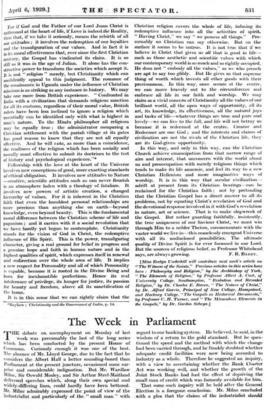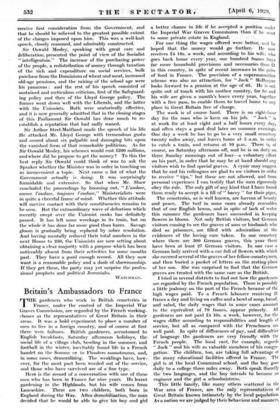The Week in Parliament
HE debate on_ unemployment on Monday of last • .i. week was presumably the last of the long series Which, has been conducted- by . the present .Hoarse of Commons. Curiously enough it was- one of the best. The absence of Mr. Lloyd George, due to the fact that he considers the Albert.. Hall a better sounding-board than Parliament at -the present juncture, occasioned some sur- prise and considerable indignation. But Mr. Wardlaw Milne, Sir Oswald Mosley, and Sir Arthur Steel-Maitland delivered speeches which, along their own special and widely-differing lines, could hardly have been bettered. Mr. Milne admirably expressed the point of view of the industrialist and particularly of _the small man " with regard to our banking system. He believed, he said, in the wisdom of a return to the gold standard. But he ques- tioned the speed and the method with which the change had been carried through, and he frankly doubted whether adequate credit facilities were now being accorded to industry as a whole. Therefore he suggested an inquiry, with a view to ascertaining whether the Bank Charter , Act was working well, and whether the growth of the Joint Stock Banks had had the effect of depriving, the small man of credit which was formerly available for him.
That some -such inquiry will be held after the General Election is a foregone conclusion: Mr. Milne concluded with a plea that the claims of the industrialist should receive first consideration from the Government, and that he should be relieved to the greatest possible extent of the charges imposed upon him. This was a well-knit speech, closely reasoned, and admirably constructed.
Sir Oswald Mosley, speaking with great care and deliberation, presented the point of view of the Socialist "intelligentsia." The increase of the purchasing power of the people, a redistribution of money through taxation of the rich and expenditure on social services, bulk purchase from the Dominions of wheat and meat, increased old-age pensions, and the raising of the school age were his panaceas : and the rest of his speech consisted of sustained and meticulous criticism, first of the Safeguard- ing policy and then of the Lloyd George policy. The former went down well with the Liberals, and the latter with the Unionists. Both were oratorically effective, and it is now generally admitted that in the closing stages of this Parliament Sir Oswald has done much to re- establish a reputation that had sadly waned.
Sir Arthur Steel-Maitland made the speech of his life He attacked Mr. Lloyd George with tremendous gusto and scored about six palpable and damaging hits upon the vanished form of that remarkable politician. As for Sir Oswald Mosley, his schemes would cost £290 millions, and where did he propose to get the money? To this the best reply Sir Oswald could think of was to ask the Speaker whether the Minister was in order in touching on so inconvenient a topic. Next came a list of what the Government actually is doing. It was surprisingly formidable and extensive. So that when Mr. Shaw concluded the proceedings by booming out, " L'audace, encore l'audace, toujoure l'audace," Ministerialists were in quite a cheerful frame of mind. Whether this attitude will survive contact with their constituencies remains to be seen. But the extraordinary wave of defeatism which recently swept over the Unionist ranks has definitely passed. It has left some wreckage in its train, but on the whole it has done far more good than harm. Savage gloom is gradually being replaced by sober resolution. And having mentally reduced their total numbers in the next House to 250, the Unionists are now setting about obtaining a clear majority with a purpose which has been noticeably absent from their activities for some months past. They have a good enough record. All they now want is a reasonable policy and a dash of showmanship. If they get these, the party may yet surprise the profes- sional prophets and political Jeremiahs.
WATCHMAN.







































 Previous page
Previous page